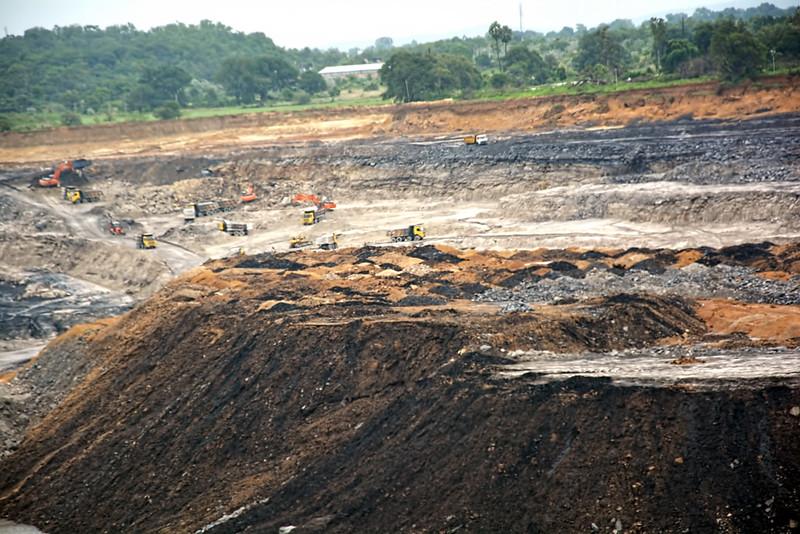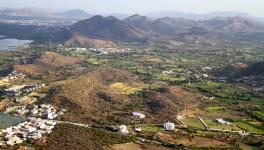Illegal Miners Set to Make a Comeback After Goa Govt Auctions 4 Iron Ore Blocks

New Delhi: Billionaire businessman Anil Agarwal’s London headquartered firm, Vedanta Group, despite being accused of illegal mining in Goa, is all set to resume extracting iron ore from a block on which its operations had been suspended five years ago by the Supreme Court. Goa Chief Minister Pramod Sawant announced last week that Vedanta had successfully bid for one of the four iron ore blocks put up for auction by the Bharatiya Janata Party-led government, that is, the Bicholim iron ore block.
In February 2018, the Supreme Court nullified the Goa government’s decision to renew 88 mining leases, including Vedanta Group’s Bicholim iron ore project. Instead of issuing new leases, the state government renewed the leases where mining activities had been termed illegal by the Supreme Court.
In fact, in April 2014, the Supreme Court held in a landmark judgement that all mining activities in operation in Goa after the year 2007 were to be deemed illegal. Roughly eight months after being re-elected to power in Goa, the BJP-led Pramod Sawant government floated a tender to auction four iron ore blocks in which Vedanta has won the Bicholim block.
This is the first instance that mineral blocks are being auctioned by the government in the coastal state but the process has been undertaken without having a policy at hand for grant of mining leases.
“There is zero transparency in the way mining activities are being resumed. The public has not even been consulted. Although required by the Supreme Court, the Goa government does not even have a policy on the grant of mining leases, having withdrawn its policy in 2016. Despite the absence of a policy, and the formation of the Goa Mineral Development Corporation last year, the state government has gone ahead with auctioning iron ore blocks,” said Rahul Basu of Goa Foundation, an environmental NGO on whose petitions all mining in Goa was ruled illegal and the state ordered to issue fresh leases as per its policy.
Notably, it is only last week that the Supreme Court granted powers to the Goa government to decide on the mechanism to handle dumps of iron ore which are lying across the state in at least 313 locations. These dumps comprise a mammoth 733 million tonnes of low-grade iron ore.
“The Goa Mineral Policy 2013 had directed that previously extracted iron ore, which has been lying around in dumps since the time illegal mining was halted in the state, were to be cleared before granting of new leases. The state government has begun the auction process even before clearing all the iron ore dumps,” added Basu.
Meanwhile, yet another private firm, Rajaram N S Bandekar and Company Private Limited has “retained” its mining lease by successfully bidding for the Monte de Sirigao mines which it won in the third round of e-auction last week.
Earlier, the 88 mining leases had been nullified by the Supreme Court because instead of issuing new licenses as per the apex court’s directions of April 2014, the Goa government had simply renewed the leases of old mining blocks including Vedanta’s Bicholim project. A division bench of the Supreme Court had observed the following about Goa’s mining activities in the February 2018 judgement in which it cancelled the renewal of 88 leases:
“The primary beneficiary was, of course, the mining lease holder, a private entity, and the price was paid by the average Goan who had to suffer a polluted environment and witness the damage to the State’s ecology,” the Supreme Court had said.
Nonetheless, Vedanta had filed a review petition against the February 2018 order which was also rejected by the Supreme Court in July last year. A few weeks after the rejection of the review petition, the state government passed a Bill in the Goa Assembly, amidst a walkout by Opposition political parties, for the formation of a state-run mineral development corporation.
The government claimed that the new mineral development corporation would enable the resumption of mining in the state in an orderly manner. But the Bill had been criticised by activists and Opposition political parties for its silence on how those accused of illegal mining were to be kept out of the fray. The GMDC, which was formed toward the fag end in the power of the earlier BJP government in Goa, was termed by activists as a backdoor method to award contracts to those accused of illegal mining.
On September 30, 2022, the Goa government floated tender inviting bids for the auction of four iron ore blocks in the state. Apart from Bicholim, bids were also invited for the Sirigao-Mayem, Monte De Sirigao and Kalay iron ore blocks. The Bicholim block spread across an area measuring roughly 478.50 hectares with total available mineral resources of 8,49,23,950 tonnes.
Another iron ore block has been successfully bid for by Salgaocar Shipping Company Private Limited. The bidding is being conducted through the central government public sector undertaking MSTC Limited.
As per the bid documents as many as 16 clearances – including environmental clearance, forest clearance, wildlife clearance and ground water clearance – have to be mandatorily submitted for each of the auctioned mining blocks before commencing with extraction activities. But successful bidders can immediately commence mining operations if these clearances are still valid. Apparently, environmental clearances of most of the mining leases, whose renewal by the Goa government had been nullified by the Supreme Court in 2018, are still valid.
Goa chief minister Pramod Sawant told Press Trust of India (PTI) during the course of an interview published on the website of the news agency on October 1, 2022, that environment clearances of as many as 86 mining leases are live.
“The fresh extraction of ore will start by November 2023. Environment clearances (ECs) for 86 mining leases are live and they can start the extraction immediately. The live ECs can be used by the companies after winning the auction for another two years and then they will have to apply for fresh ones as per the Mines and Minerals (Regulation and Development) Act,” PTI quoted the CM as saying.
It is not immediately clear how many of these clearances are still valid for the Bicholim mining project. Environmental clearance for the Bicholim iron ore project was first granted by the central government on November 17, 2005. The validity of the clearance was subsequently extended in September 2007 when the iron ore block belonged to the Goa-based Dempo Mining Corporation Private Limited. In 2009, all mining assets of the Dempo Group had been acquired by Vedanta Group subsidiary Sesa Goa Limited for Rs 1,750 crore.
A questionnaire was emailed to Vedanta asking, amongst other queries, how many of the clearances are still valid and on the latest date by which the company plans to resume mining from the Bicholim iron ore block. The company was also asked as to what steps, if any, were being planned by it to ensure ecological sustainability as and when it resumes mining. A Vedanta official said that the company would not comment on the matter at present since it is in a very nascent stage.
Incidentally, Vedanta subsidiary Sesa Goa, which owned the Bicholim iron ore block when mining activities were brought to a halt, had emerged as the single-largest illegal miner in the coastal state following investigations conducted by Justice Shah MB Shah Commission of Enquiry. The amount that was estimated to be recovered from Sesa Goa, in terms of proceeds made by the company from illegal mining of iron ore in the five-year period between 2007 and 2012 was pegged at a whopping Rs 20,924 crore.
Notably, mining operations are set to resume even as the Goa government has failed to restitute the massive ecological damage caused in the state on account of illegal mining. The division bench had observed in its February 2018 order:
“Rapacious and rampant exploitation of our natural resources is the hallmark of our iron ore mining sector – coupled with a total lack of concern for the environment and the health and well-being of the denizens in the vicinity of the mines. The sole motive of mining lease holders seems to be to make profits (no matter how) and the attitude seems to be that if the rule of law is required to be put on the back burner, so be it.”
The Goa government is also yet to recover the amount of Rs 35,000 crore from illegal iron ore miners, a figure which had been determined as the quantum of loss to the state exchequer by the MB Shah Commission of Enquiry.
On the basis of the MB Shah Commission of Enquiry, a three-judge division bench of the apex court had ruled in April 2014:
“In the result, we declare that: (i) the deemed mining leases of the lessees in Goa expired on 22.11.1987 and the maximum of 20 years renewal period of the deemed mining leases in Goa expired on 22.11.2007 and consequently mining by the lessees after 22.11.2007 was illegal.”
As per reports, at least five corporate conglomerates had made a beeline for acquiring the Bicholim iron ore block by bidding in the auction process. However, Vedanta Group emerged as the highest bidder for the block with a bid promising to share 63.55% of the revenue generated with the government.
The writer is an independent journalist.
Get the latest reports & analysis with people's perspective on Protests, movements & deep analytical videos, discussions of the current affairs in your Telegram app. Subscribe to NewsClick's Telegram channel & get Real-Time updates on stories, as they get published on our website.
























